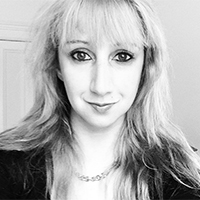In 2003, my mother passed away from breast cancer. It was her second round of it. Her first time was in 1995.
“If a hospital ever puts you in a nice room with a couch, it’s not going to be good news,” I remember my mom saying.
In February of 2016, my father passed away from lung cancer. He never smoked. Both parents maintained healthy lifestyles. They were even vegetarians for a while.
ADVERTISEMENT
Not long after my dad’s funeral, I decided that I should be proactive about my health. At a Planned Parenthood checkup, I told the doctor about my family history and said I wanted to get genetic testing done.
I never thought I’d end up in a nice room with a couch a few weeks later. But that Planned Parenthood visit saved my ass. Well, my breasts. Actually, it led to me losing my breasts which in turn saved my life.
A Planned Parenthood doctor gave me a referral to get genetic testing in a nearby hospital, the University of Vermont Medical Center. Genetic testing uses blood samples to test for inherited genetic mutations. Mutations BRCA1 and BRCA2 increase the risk of breast and ovarian cancer.
While at my Planned Parenthood appointment, my doctor also gave me a breast exam. She found nothing unusual, which is what I anticipated. At 33, I wasn’t expecting to be diagnosed with cancer. I figured if I were to follow in my mother’s footsteps it would be when I was in my forties, just like her.
Even though there were no signs of cancer, the doctor suggested I meet with doctors at the breast care center in the same hospital as the genetic testing. She said that early mammograms may be appropriate for someone like me. She, like most doctors I have seen at Planned Parenthood, was empathetic and didn’t have a shred of condescension.
I got my blood drawn for the genetic test at the hospital and not long after I received a call that I was not genetically predisposed for cancer. I didn’t have BRCA1 or BRCA2. Awesome, I thought. Cancer is not in my genes after all.
I still had the mammogram appointment set up, but it didn’t seem pressing to me. I figured it was great I was starting such tests early, that I was ahead of the game. I even canceled my first appointment. It was early in the morning and I didn’t feel like going.
When I went to my rescheduled appointment a few weeks later, I got my mammogram and was told to sit back in the waiting room to meet with a doctor. I figured I had done my proactive duty, that the mammogram would be clear and the doctor would tell me to come back in a year or two.
But that didn’t happen. Calcifications were spotted on my left breast and more mammograms were required. After additional, more concentrated, mammograms, I was taken into a small, nicely decorated room with a couch and a box of tissues. Pamphlets about breast cancer hung on the wall.
Remembering what my mom said about nice hospital rooms, I began to cry.
A biopsy was promptly scheduled. A few days after the biopsy I received a call that I had cancer. My cancer was deemed invasive. That meant it was spreading.
Prior to surgery, it wasn’t clear if the cancer had spread anywhere outside of the breast. It was unclear what stage it was. I was offered a few options for how to treat it, all of which sucked. I could have just had the cancerous parts of my breast removed and then received radiation, but that would have resulted in a more unsightly result (and that’s a medical professional’s words) than a double mastectomy.
I reluctantly opted for a full mastectomy in hopes of avoiding chemotherapy and radiation. During mastectomy surgery, lymph nodes are tested for cancer. If the cancer has spread to the lymph nodes, it typically means a later stage. A later stage means that chemotherapy is likely unavoidable.
The surgery revealed, thankfully, that I didn’t need that. I had stage one cancer.
I was relieved. I’m extremely lucky. No radiation or chemotherapy was recommended because it appears the cancer has all been cut out. There is a very high chance that I am now cancer-free.
It was caught so early that I didn’t even have to go on Tamoxifen, an anti-estrogen drug used to treat breast cancer alongside other treatments. I have been told by doctors and cancer survivors alike that, quite frankly, the medication sucks. It takes five to 10 years to work, and can be an annoying frosting on an already shitty cancer cake.
First you lose your tits, then you go on a medication for a decade that can make you fat, give you mood changes, and will prohibit you from drinking wine.
I don’t have to do all that. I got to stop at the loss of tits part.
I was saddened and angered to hear Speaker Paul Ryan announce his plans to cut federal money to Planned Parenthood and that the plan has moved forward in Congress. Planned Parenthood offers a whole lot more than just abortions.
I have never had an abortion, but Planned Parenthood has saved my ass many times. They provided me inexpensive birth control when I needed it, both for birth control and complexion reasons. (My skin breaks out when I don’t have it.)
But most importantly, Planned Parenthood suggested and referred me to tests that led to an early cancer diagnosis.
I am, for the most part, about to return to my lifestyle as it was before. I have Planned Parenthood to thank for pushing me in the right direction to have my cancer detected early.
If it weren't for Planned Parenthood, my breast cancer would not have been detected early and I would likely be spending my late thirties undergoing chemotherapy, or worse.





